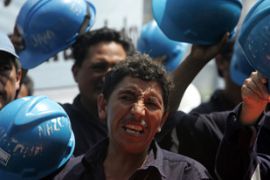Little progress over Peru strike
Miners demanding better benefits continue an indefinite nationwide strike.

“There are advances but they are not very significant,” Luis Castillo, the secretary-general of the National Federation of Metallurgic and Steel Miners organising the strike, said. “I think perhaps we might not have an agreement in the end.”
Deadline
Some mines have been affected by the indefinite strike, including one owned by Southern Copper, one of the biggest copper companies in the world.
Jorge Villasante, a Labour ministry negotiator, said: “We are concentrating all our efforts in advancing the talks and arriving at an understanding that will allow the strike to be lifted by Thursday, at the latest.”
Castillo had pledged to consult member unions on Thursday about the possibility of ending the strike, depending on progress made in the talks, but did say that workers would be called to Lima for further protests if talks had not progressed by midday.
Despite the strike, workers at many of the country’s other large pits have reported for duty as usual and as of Wednesday, none of Peru’s major mining companies had been obliged to declare force majeure, the legal protection invoked when unforeseen events hinder a company’s ability to carry out normal operations.
The employment ministry has said less than five per cent of the mining sector’s 120,000 workers joined the strike, while the union federation has estimated the number of protesting workers at 27,000.
Peru‘s mining federation is made up of 74 unions, representing about 22,000 people.
Regional protests
Mining is one of Peru‘s main economic drivers and accounts for more than half of export earnings.
The majority of the country’s mines are controlled by large multinational companies, whose profits have risen sharply due to high metals prices. Workers’ demands for a greater share of those profits have also risen accordingly.
Meanwhile president Alan Garcia’s government was also dealing with several regional strikes on Wednesday.
Farmers organisations in the north of the country blocked the strategic Pan-American road beginning a three-day strike, protesting at land being given to private enterprises and pollution by mining transnationals.
Coca leaf farmers from central jungle areas are also protesting, against the eradication of their plantations.